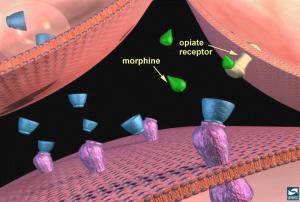Opiates are addicting, they include heroin, morphine and prescription painkillers. The use of these opiates is self-reinforcing. This means people who are dependent on opiates will keep seeking them, because opiates make them feel good. New neurobiology research has been conducted on why opiate dependency is so powerful.
How Does Opiate Dependency Work?
Opioids act on specific receptors in the brain and body. In the nucleus accumbens, three types of neurons are involved with the action of opiates. One neuron releases dopamine, this can be seen in the left side of the graphic.
The post-synaptic cell in pink contains the receptors for dopamine. The opiates bind to the opiate receptors, which are beige-yellowish colored in the picture. After the opiates bind a signal is sent to the terminal for more dopamine to be released.

For over 25 years, people from all over the world have chosen Waismann Method as their opioid detox provider.
We know the challenges you face and the importance of creating a unique and personal experience for you right from the start.Call for Detox Options 1-800-423-2482
With repeated use of any opiate, dependence develops. When dependence has developed neurons have become adept to the drug. At this point, they only function normally with the drug – the reason many people don’t realize they need treatment. If the drug is withdrawn very serious or even life threatening reactions can occur.
Who is affected by Opiate Dependency?
Opiate dependency affects people from all walks of life. Opiate abuse is a worldwide problem. It affects the health and welfare of all societies. Some 12-21 million people globally abuse opioids. According to data released in 2010 in the United States alone there were nearly 2 million people dependent on opioid prescription pain relievers. Almost 400,000 people in the U.S. were abusing heroin.
The rates continue to rise and the consequences are dire. Since 1999 the number of overdose deaths has quadrupled. Abuse of opioids, heroin in particular, put you at a higher risk for contracting human immunodeficiency virus (HIV), hepatitis, sexually transmitted infections and other blood-borne diseases.
How Can Rapid Detox Help Reverse Opiate Dependency?
We know opiates are addicting and we believe that opiate dependency isn’t a social stigma, and that it can be reversed with our advanced medical procedure called rapid drug detoxification. For many people that are dependent on drugs like oxycodone, heroin, suboxone, trying to abstain from drugs can be a difficult task. The Waismann Method Rapid Drug Detox procedure pushes all of the opiates off the receptors with medication, while the patient is under sedation or anesthesia. During this process the opiate withdrawal happens in a matter of hours instead of weeks.
The Waismann Method ® could help free you from the cycle of drug abuse and dependency. Call now to speak with one of our care specialists, we are available to give you more information about rapid drug detox. Feel free to contact us during business hours at 1-888-987-4673 or (888)-987-HOPE. To reach us in the evenings or on weekends call (310) 927-7155.





